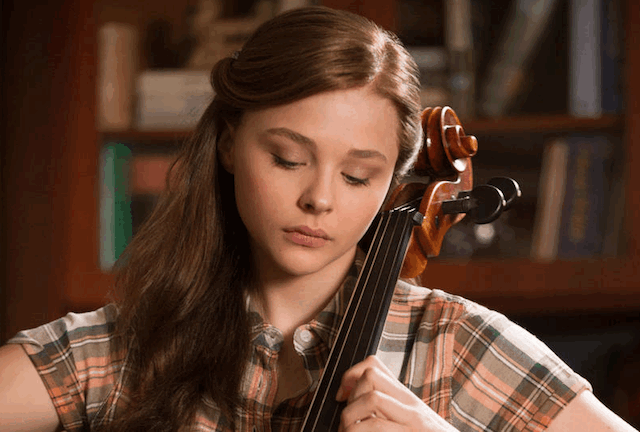
Chloë Grace Moretz (sort of) playing the cello in ‘If I Stay’ (Image: New Line Cinema/MGM)
As a rule, playing the cello is hard.
That’s what Chloë Grace Moretz found out at the end of the seven months she spent practicing the instrument while preparing for her role in If I Stay, where she plays the prodigy teen cellist Mia Hall.
The movie, which is based on a popular young adult novel, and has pulled in over $33 million as it rounds out its second week at the box office, is as much a coming-of-age story as a coming-to-terms-with-life-by-way-of-death story. Both such comings, it turns out, are pretty hard-going. (There’s also a first romance with a cute boy, but since this is a teen movie, it’s of a piece with the general angst.)
If the point is that the wisdom to tackle life’s toughest challenges doesn’t come easily, the cello is a good supporting argument for it. Cellists typically study for anywhere between ten and twenty years before reaching the professional level. Yet even the instantaneousness we’ve come to expect from a world equipped with Tinder hasn’t pushed classical music—and the long, intense commitment it demands of those who play it—out of popular consciousness.
Instead, cellos have become full citizens of the digital republic and fast friends with its technologies. Erin and Her Cello is one of the best cello-centric Internet bands you’ve never heard of, and they’ve made skillful use of Kickstarter and social media to get their music out there. On the higher-brow (and -tech) end of things, the sound artist Mileece, who harnesses the energy produced by plants to generate quasi-musical compositions, supplements her work with classical instruments, notably the cello.
There’s also a thriving web community of cellists and cello enthusiasts. It’s given birth to the Portland Cello Project, founded in 2007 to find new audiences and musical contexts for cellos. The forum maintained by the Internet Cello Society, called “CELLO CHAT!”, is contributed to hourly. The day before If I Stay hit theaters, someone posted a detail of the movie poster and commented, “doesn’t it look like the bow is several inches below her hand and . . . possibly backwards?”
Another user added, circumspectly, “I’m planning on seeing the film this weekend, so I’ll tell you guys if they did a good job.”
One of the creepier moments in If I Stay comes when Mia’s boyfriend Adam (Jamie Blackley) perfectly tapes together a scale version of the Juilliard performance hall fresco on her bedroom ceiling. Getting into Juilliard to study the cello is the cardinal goal that Mia nurtures with a mystical intensity. Moretz herself has asserted that “you have to surrender your soul to the instrument.”
I asked Darrett Adkins, who teaches the cello at Juilliard, to explain its mystique.
“The cello is a very expressive and beautiful instrument,” he said. “It is difficult to play and thus exotic to most popular music. I have been told that its range and tone color most closely resemble that of the human singing voice. Combine those traits and you have a recipe for a certain amount of interest in the pop world.”
But Adkins concedes the film would probably have worked just as well with a different instrument at its center.
“I don’t think the cello is any different from any other highly demanding pursuit—artistic or intellectual, or even athletic, in terms of crafting a narrative . . . about the kind of passion and purpose that some people exhibit at an early age to follow a dream.”
And indeed, there’s a certain appeal to such narratives that, come what may from the digital age, seems genuinely universal. “To me,” Adkins added, “the cello is unique and magical, but all performing arts share the distinct adrenaline of recreating—in real time and in front of an audience—something profoundly beautiful and expressive.”
That’s one experience If I Stay can’t deliver as authentically as a live performance. Moretz plays Mia, and Mia plays the cello, but despite her months of practice, Moretz cannot.
For those scenes, her face was digitally grafted onto the body of a professional cellist—who can.
·
 Rich Bellis is a blog editor for The Brooklyn Quarterly. He has written for The Atlantic and World Policy online, The Awl, BUST, and other publications.
Rich Bellis is a blog editor for The Brooklyn Quarterly. He has written for The Atlantic and World Policy online, The Awl, BUST, and other publications.
